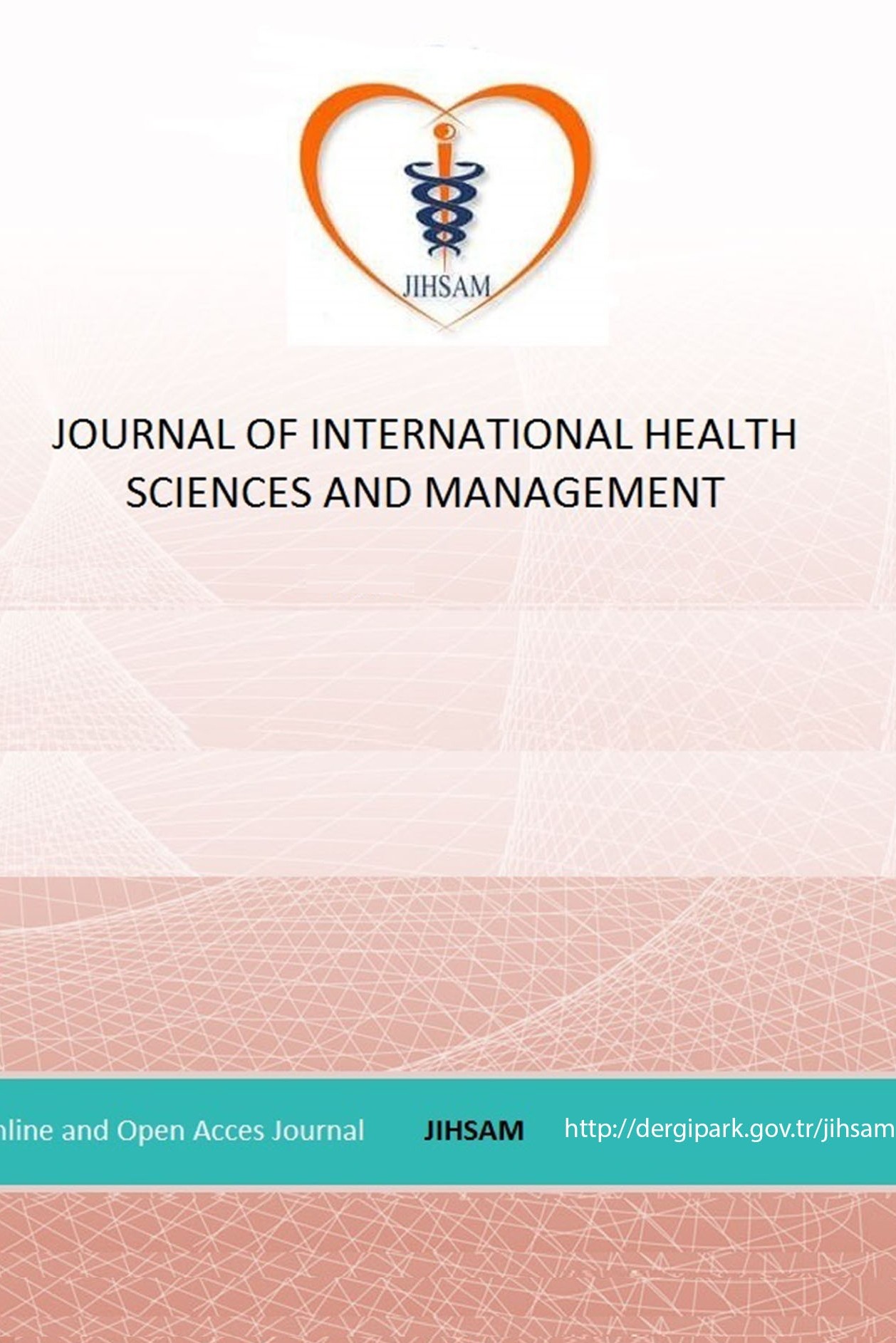The Importance of Job Satisfaction, Organizational Commitment and Problem-Solving Competence in Nurse Human Resource Management
The Importance of Job Satisfaction, Organizational Commitment and Problem-Solving Competence in Nurse Human Resource Management
Nurse human resource management, job satisfaction organizational commitment, problem solving,
___
- Akın S, Gungor I, Mendi B, Sahin N, Bizat E, Durna Z (2007). Nursing student’s problem-solving skills and Internal-external locus of control. Journal of Education and Research in Nursing; 4(2): 30-36.
- Al-Zu'bi HA (2010). A study of relationship between organizational justice and job satisfaction. International journal of business and management; 5 (12):102-109.
- Amiri M (2007). The study of knowledge, attitude and performance of managers with conflict management background in faculty of medical sciences of Shahroud. The Horizon of Medical Sciences; 12:50-54.
- Azim MT, Haque MM, Chowdhury RA (2013). Gender, marital status and job satisfaction, an empirical study. International Review of Management and Business Research; 2 (2):488-498.
- Başar, G., Akın, S. and Durna, Z. (2015). Evaluation of Problem Solving and Communication Skills in Nurses and Nursing Students. Gümüşhane University Journal of Health Sciences, 4 (1), 125-147
- Chen SY, Wu WC, Chang CS, Lin CT, Kung JY, Weng HC, (2015). Organizational justice, trust, and identification and their effects on organizational commitment in hospital nursing staff. BMC Health Services Research; 15(1):363-369.
- Çam S, Tümkaya S (2007). Development of interpersonal problem-solving inventory (CPSI): A study of validity and reliability. Turkish Journal of Psychological Counseling and Guidance; 3(28).
- Çetinkaya S (2013). The effect of problem-solving education on problem solving skills, interpersonal relationship style and anger control in male high school student adolescents (Master thesis). Adnan Menderes University. Health Sciences Institute, Aydın.
- Dağlı A, Elçiçek Z, Han B (2018). Adaptation of Organizational Commitment Scale into Turkish: Validity and reliability study. Electronic Journal of Social Sciences; 17(68): 1765-1777.
- Dede G (2021). The relationship between problem solving and solidarity in the profession in nurses (Master thesis). Maltepe University Graduate Education Institute, Istanbul.
- Durak Batıgün A, Hisli Şahin N (2006). Two scales for work stress and health psychology research: Type A personality and job satisfaction. Turkish Journal of Psychiatry; 17(1):32-45.
- Dündar T (2015). The Relationship Between Organizational Justice Perceptions and Job Satisfaction Levels (Master Thesis). Yıldız Teknik University. Social Sciences Institute, Istanbul.
- Er, Y., Aktaş, S., Türker, A., Güven, F. & Alkan, N. (2018). Evaluation of Self-Esteem and Problem-Solving Skills of Physical Education and Sports Teaching and Classroom Teaching Students. Mus Alparslan University International Journal of Sport Sciences, 2 (1), 16-29.
- Erkuş, B. and Bahçecik, N. (2015). Critical thinking level and problem-solving skills of nurses and nurses working in private hospitals. Clinical and Experimental Health Sciences, 5 (1), 1-9.
- Gemlik, N. and Sur, H., (2004). A Study on the Perception Level of Problem-Solving Skills of Private Hospital Managers, Journal of Physical Education and Sport Sciences, 11(2).
- Karakurt, N., and Ekinci, M. (2015). The Relationship between Nurses' Perceived Social Support and Problem-Solving Skills. Gümüşhane University Journal of Health Sciences; 4(4).
- Kelleci, M., and Gölbaşı, Z. (2004). Investigation of Problem-Solving Skills of Nurses Working in a University Hospital in Terms of Some Variables. Journal of Cumhuriyet University School of Nursing, s: 1-8.
- Kızılkaya G, Aşkar P (2009). Problem çözmeye yönelik yansıtıcı düşünme becerisi ölçeğinin geliştirilmesi. Eğitim ve Bilim; 34(154):82-92.
- Koç Z, Koyuncu S, Sağlam Z (2015). Problem Solving Skill Levels of Health School Nursing and Midwifery Students and Affecting Factors. Education and Research in Nursing, 12(1), 41 - 50.
- Koyutürk A (2015). Health Workers Of Organizational Justice and Job Satisfaction in Example of a Public Hospital (Master thesis). Okan University. Health Sciences Institute, Istanbul.
- Meyer JP, Allen NJ (1991). A three-component conceptualization of organizational commitment. Human Resource Management Review: 61-89.
- Sağır M (2016). Job satisfaction in aging workforce ministry of national education (Master thesis). Cankaya University. Social Sciences Institute, Ankara.
- Taşçı S (2005). Problem solving process in nursing. Journal of Health Sciences; 14:73-78.
- Türe A, Akkoç İ (2020). The effect of perceived trust in the working environment on job satisfaction levels of nurses. Turkish Journal of Social Sciences Studies;5(2);136-152.
- Ulupınar, S. (1997). The Effect of Nursing Education on Students' Problem-Solving Skills (Doctoral Thesis). Istanbul University Institute of Health Sciences, Istanbul.
- Yıldırım N (2016). Evaluation of nurses' entrepreneurial personality traits, problem solving skills and effective factors (Master thesis). Istanbul Bilim University Institute of Social Sciences, Istanbul.
- Yıldırım B, Bağsürer N (2019). Investigation of Problem-Solving Processes of Nurses Working in a University Hospital. Middle East Journal of Medicine; 11(1):27-33.
- Yıldırım B, Özkahraman Koç Ş, Sarıkaya Karabudak S (2014). Examining the relationship between nursing and midwifery students' problem-solving skills and learning styles. Gumushane University Journal of Health Sciences; 3(3):859-882.
- Yiğiter K (2012). The effect of recreational activities on perceived problem-solving skills and self-esteem levels of university students (Master thesis). Kocaeli University Health Sciences Institute, Kocaeli.
- Yorulmaz M, Kıraç R and Yılmazsoy B (2018). The Effect of Demographic Characteristics of Healthcare Professionals on Job Satisfaction. 2. International 12. National Health and Hospital Administration Congress Full Text Proceeding. Page: 844-851.
- Yayın Aralığı: Yılda 2 Sayı
- Başlangıç: 2015
- Yayıncı: Sedat BOSTAN
Burcu GÜRER GİRAY, Gökçe GÜVEN AÇIK, Yunus Emre BULUT, Asiye Çiğdem ŞİMŞEK, Mustafa Sırrı KOTANOĞLU
THE RELATIONSHIP BETWEEN HEALTH COGNITIONS AND HEALTH SEEKING BEHAVIOR
Pelinsu Buket DOĞANYİĞİT, Hasan Fehmi DEMİRCİ
Ayşegül TURAN, Omar ABED ALİALAH
Denetçilerin Bakış Açısıyla Sağlıkta Akreditasyon
A Relational Analysis of Violence inflicted on Healthcare Professionals
Altuğ ÇAĞATAY, Selman KIZILKAYA
Ali GÖDE, Yunus Emre ÖZTÜRK, Fatma Nuray KUŞCU
Assessment of Epidemiology Courses in Health Management Undergraduate Education in Turkey
SAĞLIK ÇALIŞANLARINDA PRESENTEEİSM VE İŞ YAŞAM DENGESİ ARASINDAKİ İLİŞKİ
